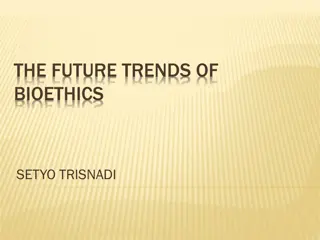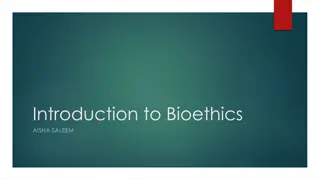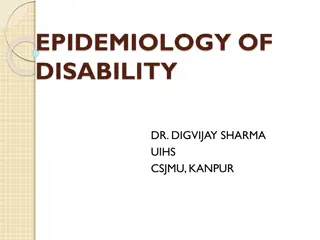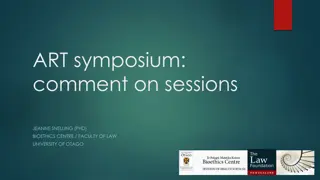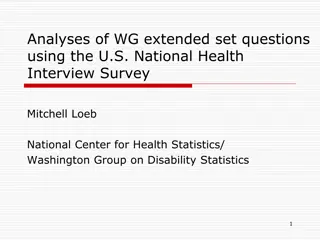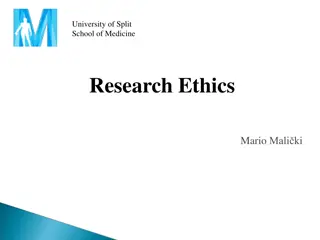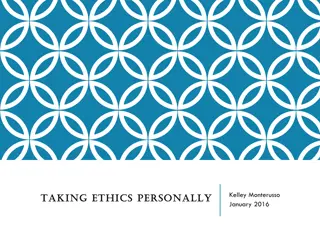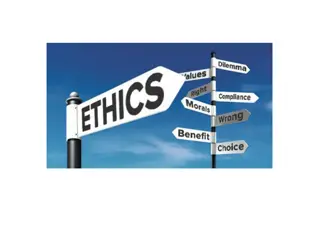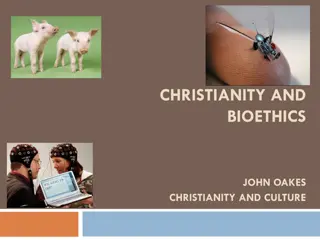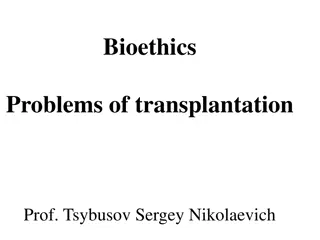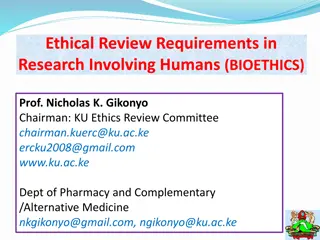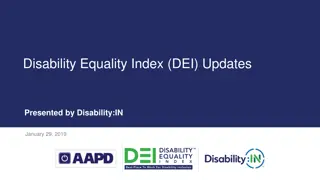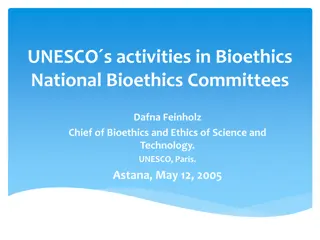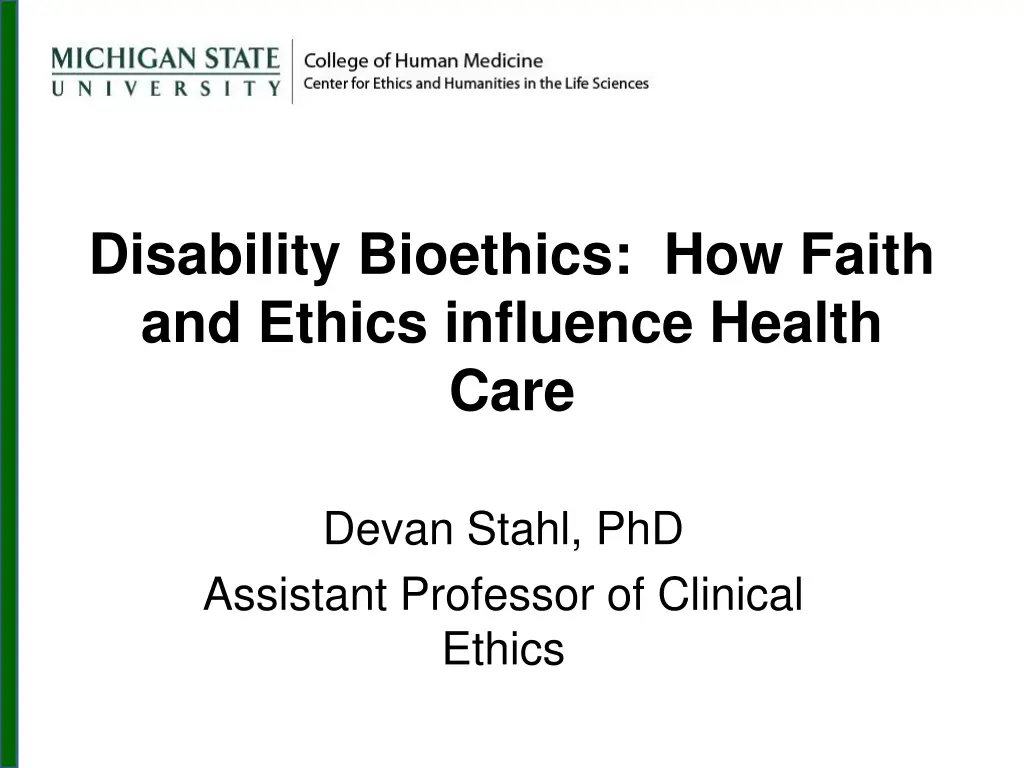
Influence of Faith and Ethics on Health Care
Explore the intersection of faith, ethics, and disability bioethics in health care, understanding the role of clinical ethicists, addressing ethical dilemmas, and the functions of ethics committees and consultants.
Download Presentation

Please find below an Image/Link to download the presentation.
The content on the website is provided AS IS for your information and personal use only. It may not be sold, licensed, or shared on other websites without obtaining consent from the author. If you encounter any issues during the download, it is possible that the publisher has removed the file from their server.
You are allowed to download the files provided on this website for personal or commercial use, subject to the condition that they are used lawfully. All files are the property of their respective owners.
The content on the website is provided AS IS for your information and personal use only. It may not be sold, licensed, or shared on other websites without obtaining consent from the author.
E N D
Presentation Transcript
Disability Bioethics: How Faith and Ethics influence Health Care Devan Stahl, PhD Assistant Professor of Clinical Ethics
Objectives 1. Understand the role of clinical ethicists and the history behind their existence 2. Review the continuing controversies between bioethics and disability rights 3. Practice resolving ethical dilemmas in health care using the methods of clinical ethics consultants
What is Bioethics? Bioethics is an activity; it is a shared, reflective examination of ethical issues in health care, health science, and health policy. These fields have always had ethical standards, of course, handed down within each profession, and often without question. About forty years ago, however, it became obvious that we needed a more public, and more critical, discussion of these standards.
What does an ethics committee do? 1. Recommends ways to resolve ethical dilemmas as they occur in health care 2. Educates hospital staff 3. Authors policies and procedures to ensure ethical decision making occurs
Who is on the ethics committee? Clinicians and hospital staff (mostly volunteers) interested in promoting ethical practice at their institution Physicians, nurses, risk managers, hospital lawyers, PT, OT, ect. Community Members Employed or contracted clinical ethics consultants
Defining clinical ethics consultation "Health consultation ) is a set of services provided by an individual or a group to help patients, families, surrogates, health care providers, or other involved parties address uncertainty or conflict regarding value-laden concerns that emerge in health care." care ethics consultation (HCEC or ethics ASBH Core Competencies for Health Care Ethics Consultation, 2nd ed. 2011.
What is the role of a clinical ethics consultant? To promote an ethical resolution of the case at hand To establish comfortable and respectful communication among the parties involved To help those involved learn to work through ethical uncertainties and disagreements on their own To help the institution recognize ethical patterns that require attention
Why do these services exist? Theologians interested in health care The God Committee (1962) Karen Quinlan (1976) Baby Doe (1986)
Bioethics, Disability Rights, and Religion Why the 3 diverged The status of disability advocacy and religion in bioethics today Points of intersection and continuing debates
Continuing Controversies Prenatal Screening/PGD/Abortion Physician Assisted Suicide Institutionalization PID Development of prosthetics The biomedical model/ species typical functioning Quality of life determinations who gets to decide?
Group Reflection What would you like clinicians and bioethicists to know about your disability experience What would you like clinicians and bioethicists to know about your religious experience
Considering ethical implications Mr. D was admitted through the ED with cough, fever, and difficulty breathing. X-rays showed lung infiltrates. He was admitted with a presumptive diagnosis of pneumonia, and treated with broad-spectrum antibiotics. Two days later his symptoms had worsened. Bronchoscopy was recommended, and the possible need for ventilatory support was discussed. Mr. D adamantly refused both. Although in some distress, he was alert and oriented. He appeared to understand the information provided, but would not explain the reasons for his refusals.
Key Ethical Considerations Autonomy: the right to make medical decisions for yourself Right to refuse medical treatment Decisional capacity: your ability to make decisions for yourself If you do not have DC, your surrogate has an obligation to make choices as you would have made them OR to act in your best interest Beneficence/Non-Maleficence: the clinicians obligation to help and not harm you Clinicians have an obligation to prevent an avoidable death Justice: Clinicians are obligated to distribute resources fairly and not discriminate against certain patients
Ethical Diagnosis for Mr. D Do not intubate Options He has decisional capacity Reasoning He s refusing Tx Moral Right to refuse treatment Considerations
Ethical Diagnosis for Mr. D Do not intubate Intubate Options Other evidence of his values? He has capacity (?) Reasoning He doesn t have capacity (?) He s refusing Tx Moral Considerations Right to refuse treatment
Ethical Diagnosis for Mr. D Do not intubate Intubate Options Prognosis poor Prognosis good?? Reasoning He s got capacity; or not He s refusing Tx Moral Considerations Prevent avoidable death Right to refuse treatment
Small Group Exercise: The Ashley Case Ashley is born with severe developmental disabilities due to static encephalopathy of unknown origin. Physicians predict that mentally she will remain at the infant level. At 6, she begins to show early signs of puberty. Her parents are worried that if she grows too large they will not be able to take care of her at home. Her parents ask doctors to help attenuate her growth with estrogen therapy, give her a hysterectomy, remove her breast buds, and give her an appendectomy.
Ethical Diagnosis for Ashley Options Reasoning Moral Considerations


